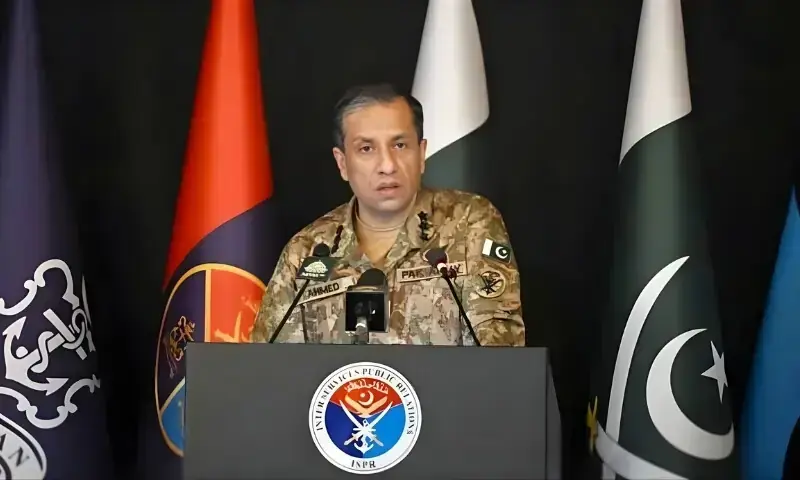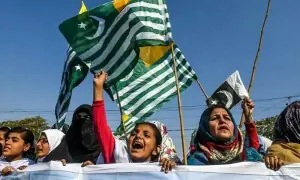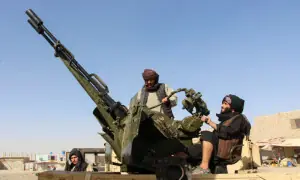Govt, parliament to decide on sending troops to Gaza: DG ISPR
Any decision to send army troops to Gaza for peacekeeping duties would be made by the government and parliament, Director General of the Inter-Services Public Relations Lieutenant General Ahmed Sharif has said.
Addressing a media briefing in Rawalpindi on Monday, the ISPR director general said that the 27th constitutional amendment is parliament’s matter, adding that the army does not wish to be drawn into politics.
Lieutenant General Ahmed Sharif said the Pakistan Army should be kept separate from political matters, reaffirming that the military’s focus remains on national security and the protection of the country’s borders and people.
“Pakistan is fully prepared to defend its frontiers and its citizens,” he said, adding that Pakistan is a sovereign state and formulates its policies independently.
The ISPR DG reiterated that Pakistan’s armed forces are the guarantor of the country’s security, not Afghanistan.
No negotiations with militants
He warned against negotiations with militant groups and urged political authorities to keep the military out of politics.
According to the DG ISPR, 1,667 terrorists have been killed in operations against the Fitna Al Khawarij terrorist group, though criminal and militant networks linked to political groups continue to hinder efforts to curb smuggling and organised crime.
He stressed that Pakistan’s priority is the complete elimination of terrorism, noting that the country will not hold talks with terrorist groups.
“The conditions set by Afghanistan are irrelevant — what matters is eradicating terrorism,” General Sharif said, adding that Pakistan’s response to the Afghan Taliban was “swift and effective” and “produced the results we sought.”
He further stated that narcotics smugglers in Afghanistan have gained influence in Afghan politics, with large quantities of drugs being smuggled into Pakistan from across the border.
Operations against banned groups to continue
The military spokesperson said that operations were underway against banned groups, including the Tehreek-i-Taliban Pakistan (TTP) and the Balochistan Liberation Army (BLA), adding that operations against these banned organisations would continue.
The ISPR DG rejected calls from the Khyber Pakhtunkhwa government to negotiate with militants, saying such discussions would only sow confusion.
“The Taliban desecrated the bodies of our soldiers — how can we negotiate with them?” he asked.
New posts in army
Responding to questions on the army’s role and structure, Lt Gen Ahmed Sharif said creation of posts within the armed forces is a matter for the civilian government and not the military.
The ISPR chief said the Afghan Taliban regime facilitated terrorists and said Islamabad had told participants at the Istanbul talks that Kabul must take responsibility for combating terrorism on its soil.
He urged Afghanistan to hand over militants who fled across the border during earlier military operations so they can be dealt with under Pakistan’s constitution and laws.
No accord with US on drone operations
He also denied any formal agreement with the United States regarding drone operations in Afghanistan, saying no official complaint had been received from the Taliban regime and that no US drones operate from Pakistani territory.
Highlighting the links between militants and organised crime, Lt Gen Ahmed Sharif pointed to a nexus involving terrorists, warlords and narcotics traffickers.
He said opium cultivation in Afghanistan is lucrative — generating roughly Rs1.8 million to Rs2.5 million per acre — and that profits are shared among the Afghan Taliban, TTP elements and local warlords, financing further violence and smuggling into Pakistan.
Checkposts on Afghan border
On border security, the ISPR DG said that Pakistan’s frontier with Afghanistan stretches some 2,600 kilometres and includes mountains and rivers, noting the practical limits to setting up security posts every few kilometres.
“A post is established roughly every 25 to 40 kilometres. You cannot have checkpoints everywhere,” he said, adding that Afghan border guards sometimes fire to facilitate cross-border movement of militants, to which Pakistani forces respond.
Addressing recent developments, Lt-Gen Ahmed Sharif said Pakistan’s response to threats from across the border had been “swift and effective,” producing the results the military sought.
He reiterated that Islamabad’s position at the Istanbul conference was clear: no terrorism, no foreign interference and no use of Afghan soil for attacks on Pakistan.
For the latest news, follow us on Twitter @Aaj_Urdu. We are also on Facebook, Instagram and YouTube.
























Comments are closed on this story.